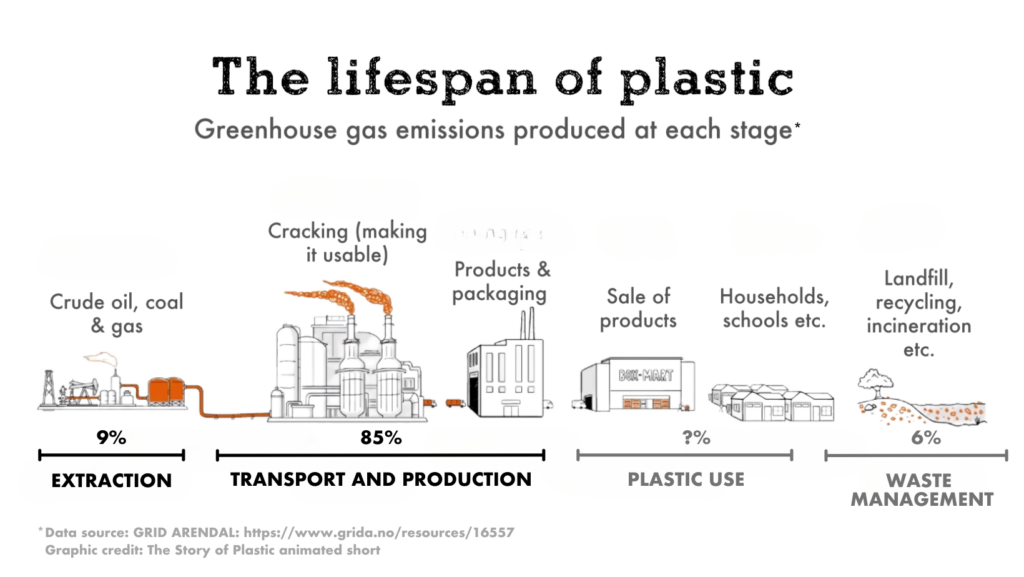The last ten years have been the hottest on record, and 2024 was the first year to surpass the 1.5-degree Celsius warming threshold that scientists have suggested will trigger irreversible damage to ecosystems. The impact is evident. From catastrophic floods in Central Europe and heatwaves across Southeast Asia to droughts in West Africa and devastating wildfires in Los Angeles, recent years have delivered an onslaught of life-threatening extreme weather events. These are not “natural disasters”, as often reported, but highly unnatural events caused by climate breakdown.
In this blog post, we’re going to explain how plastic production is driving climate change and why its impact has flown under the radar for so long.
Emissions from fossil fuels are the leading cause of climate change; and fossil fuels are the building blocks of 99% of all plastic. Global plastic production is nearing a staggering 500 million tonnes annually and is projected to triple in the next four decades. The plastics industry is the fastest-growing source of industrial emissions, already responsible for up to 8% of the global total – many times more than the 2.5% produced by the aviation industry. If plastic production increases as projected, it will consume the world’s entire carbon budget by 2060, or at the very latest 2083. This means that even if every other industry were to completely decarbonise, the plastic industry alone would still produce enough to push global warming past safe limits.
Where do the emissions come from?
Plastic generates greenhouse gas emissions at every stage of its lifecycle, from fossil fuel extraction and production, to when it is being used and finally disposal.
Over 90% of the greenhouse gas emissions attributed to plastic are released before it even reaches the public – during the production stage. The process of extracting fossil fuels, refining them and manufacturing the plastic products themselves is incredibly energy-intensive.

The role of the plastics industry
Investigations have revealed the plastics industry has a history of hiding its environmental and climate impacts. The connection between fossil fuels and climate change has been known for decades, with oil companies themselves aware of the link since at least the 1970s. Yet, they publicly denied any knowledge and continued to invest in and promote fossil fuel industries such as plastic. To protect their market, and their profit, they spent millions blocking plastic bans, lobbying against producer responsibility legislation and obstructing the Global Plastics Treaty. They also created organisations such as the American Chemistry Council and the Alliance to End Plastic Waste (AEPW), which actively promote climate change denial and misinformation.
AEPW, formed in 2019 and funded by major oil and chemical companies like ExxonMobil, Shell and Dow, actively promotes recycling and waste management initiatives – despite knowing since the 1980s that recycling plastics could never be a long-term solution. This is a classic case of greenwashing, deliberately misleading the public about the safety and sustainability of their products in order to continue producing them.
The plastic industry’s deception doesn’t end there. They invest in and promote false solutions like chemical recycling and “waste-to-fuel” technologies. These initiatives, while presented as innovative, actually perpetuate the need for waste, especially plastic. They also promote “biodegradable” and “plant-based” plastics most of which contain fossil fuels. All of this distracts from the real issues and ensures a continued market for their plastic production.
What needs to happen?
Preventing complete climate breakdown depends on urgent and drastic cuts in plastic production. While we can take steps to reduce plastic in our daily lives, such as using reusable bags and containers, avoiding single-use plastics, and supporting businesses that prioritise sustainability, ultimately we need serious system change. Governments and corporations must provide alternatives to single-use materials by investing in reuse systems that make it easy for everyone to reduce plastic use. We also need strong legislation that controls plastic production and holds polluters accountable for their impact on the climate.
A strong Global Plastics Treaty – currently being negotiated by UN member states – has the opportunity to put climate first. Unlike the weak Paris Agreement, it could include legally-binding plastic production caps that would result in a huge drop in fossil fuel emissions.
Learn more about the potential impact of the treaty and the impacts of waste on our climate in our blogposts:


Join the conversation